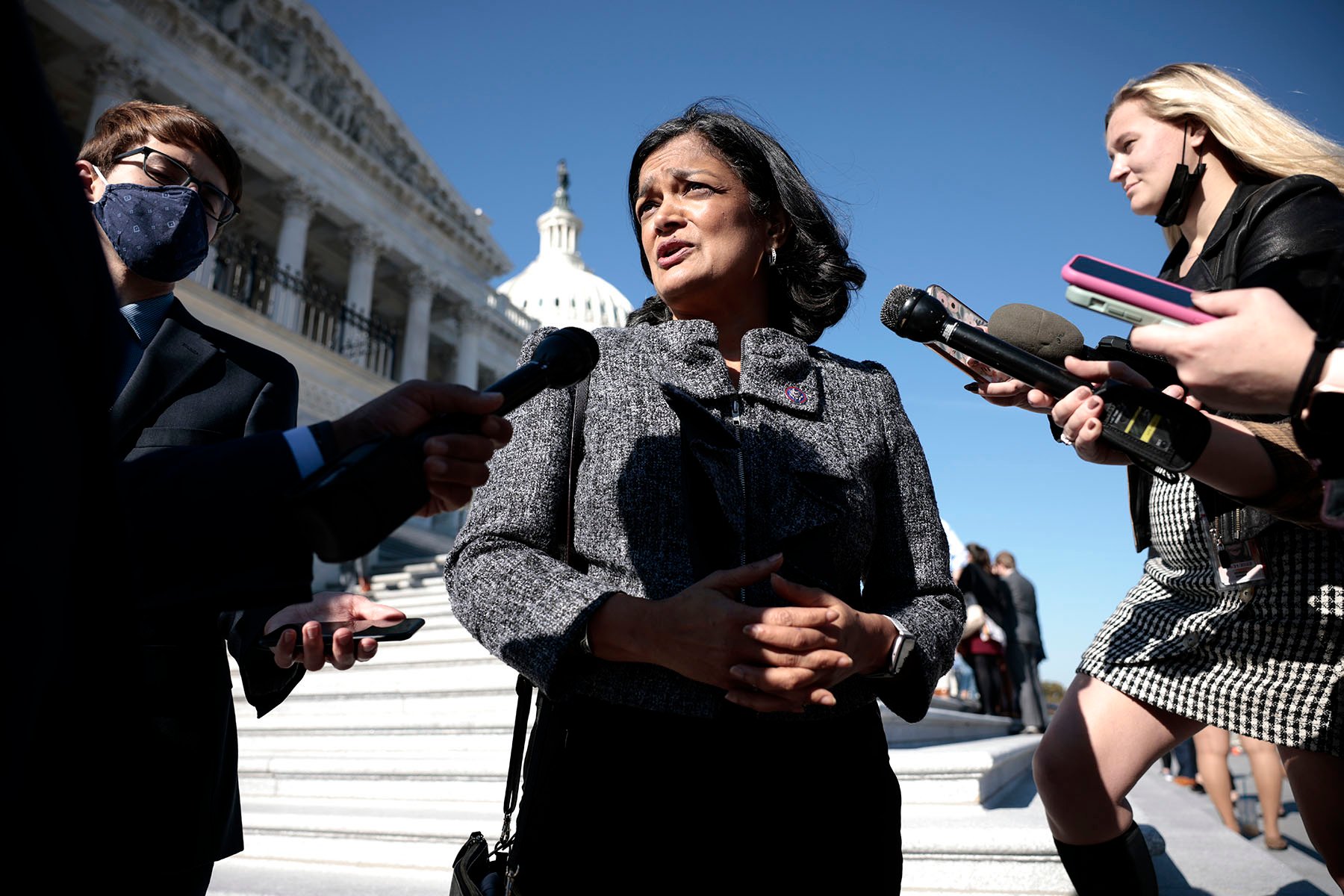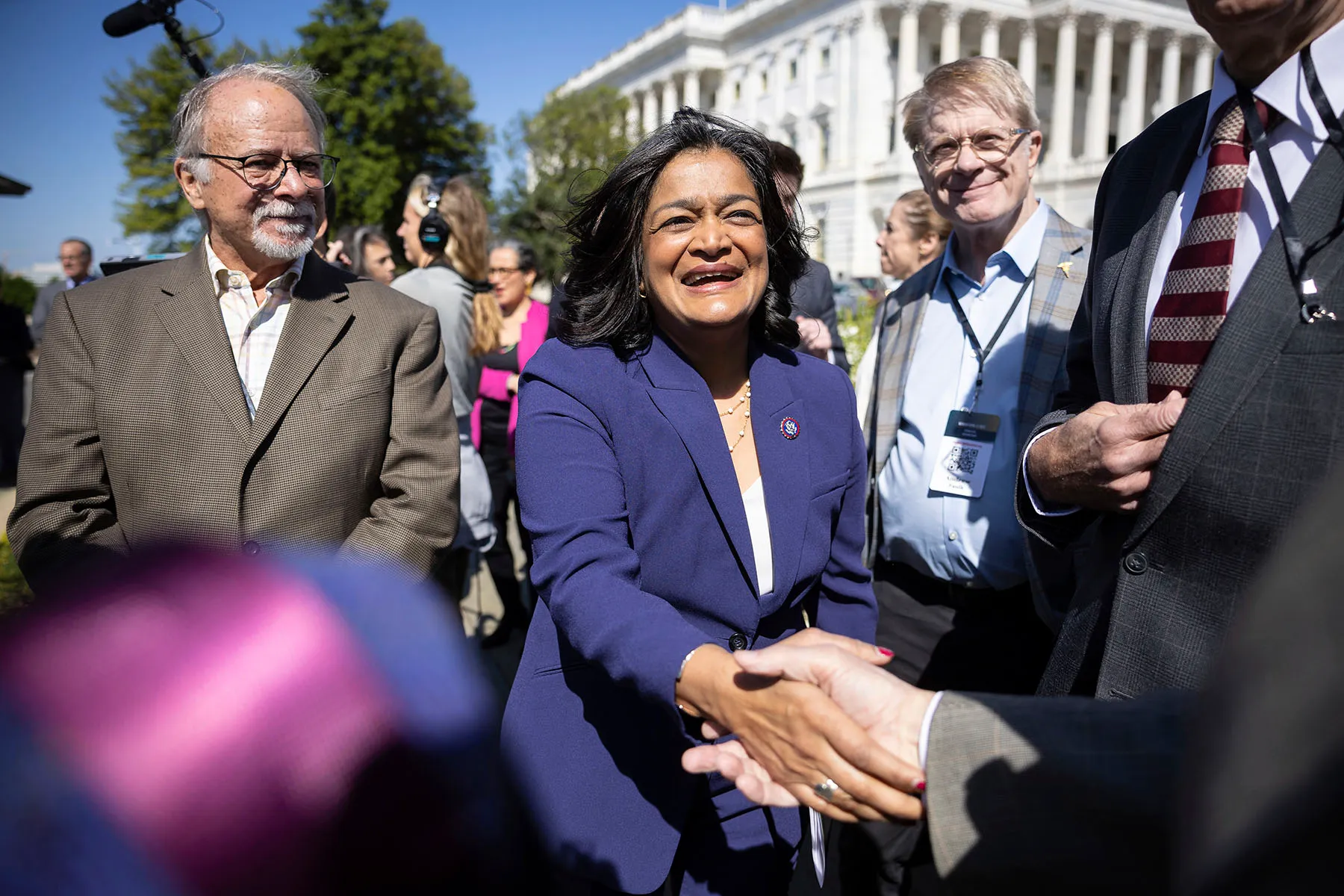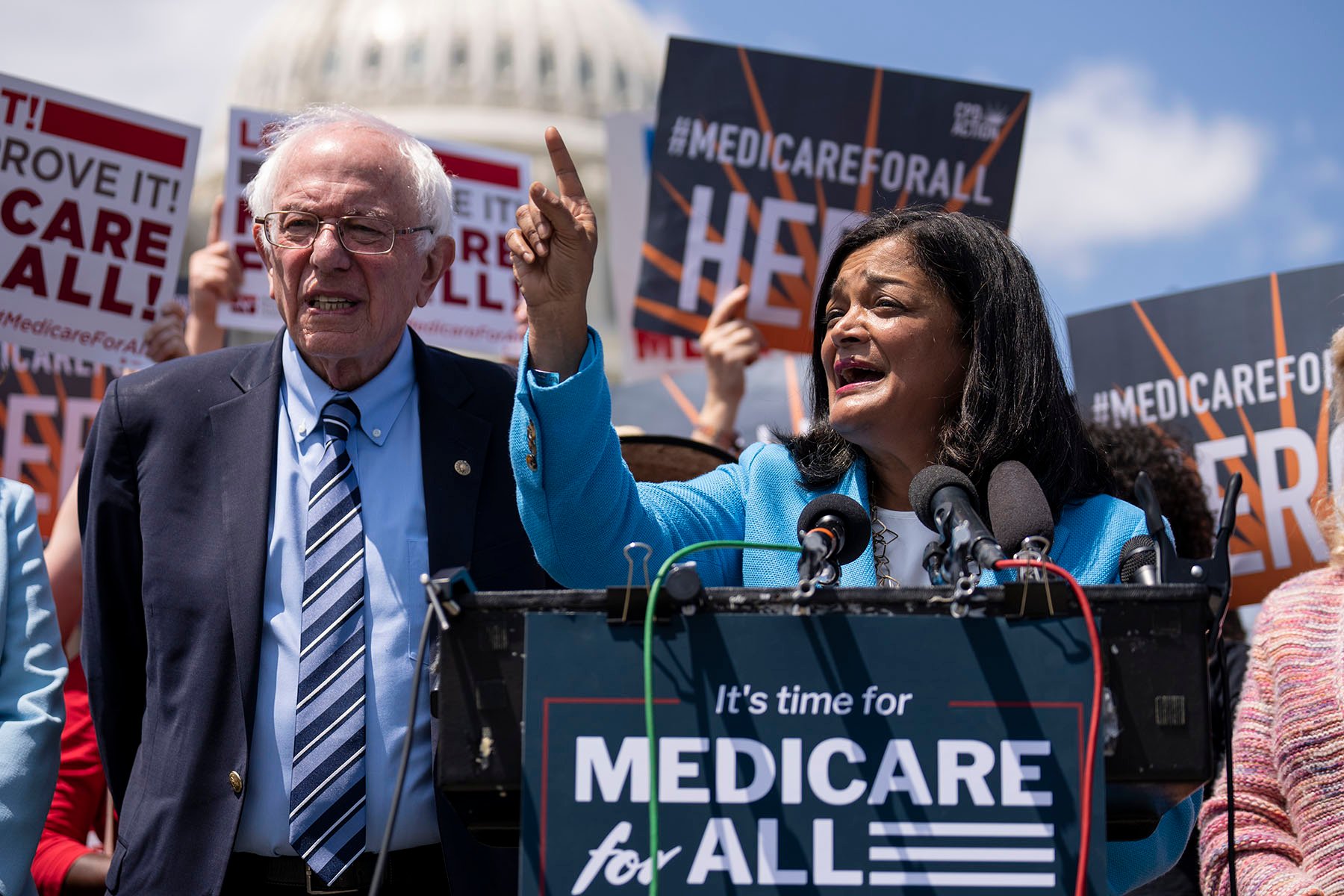When Rep. Pramila Jayapal joined the leadership of the Congressional Progressive Caucus (CPC) in 2018, Democrats were out of power. That year, the first members of “The Squad,” a group that began with four progressive women of color, were elected. Democrats won back Congress.
Progressives’ ranks and influence grew, and Democrats captured the White House — and achieved decades-long policy goals on climate change and lowering the costs of prescription drugs. Now, as progressive Democrats confront being in the legislative minority for a second term of President-elect Donald Trump, Jayapal, a fifth-term representative from Washington state, is stepping aside as caucus chair to make way for the next generation.
“I believe strongly that we have to continue to bring in new leadership and build our bench,” Jayapal said in an interview in late December. Second-term Democratic Rep. Greg Casar of Texas will lead the caucus at a time when the party faces a crossroads. Some Democrats believe the party has moved too far to the left, while progressives believe that failing to pass massive investments in the social safety net haunted them at the polls.
“If the Democratic Party was a little more like Chairwoman Jayapal and a little less like Joe Manchin, I think we would have won this election,” Casar quipped in a December 5 news conference, referring to the ex-senator who blocked much of President Joe Biden’s economic agenda.
Jayapal became a co-chair of the CPC, founded in 1991, in 2018 and ascended to chair in 2020. She led House progressives through the end of Trump’s first term and a tumultuous 2020 election, then as a united force shaping policy during Biden’s term as president — the zenith of the modern progressive movement.
“There were some amazing things that I got to preside over, and probably my biggest pride is building the CPC into a real force that was able to accomplish things for real people,” said Jayapal, who was reelected in November. “I feel very good about having done that.”
The CPC’s ranks have grown to nearly 100, and its staff has grown too, Jayapal said. Under her tenure, the caucus also built up the capacity of the CPC’s political action committee to elect new members — including nine CPC PAC-endorsed members elected in 2024 — and “reinvigorated” the CPC Center, a research and policy hub for members.
“Our co-founder, Bernie Sanders, used to say that the CPC was a place where a few people came to complain,” Jayapal joked at the December news conference. “Even six years ago, the CPC was significantly smaller and at the time, had just one full-time staff person.”
In reflecting on her tenure, Jayapal said she’s most proud of how CPC members delivered wins on longtime progressive priorities — and how they did it.
“We built a really powerful bloc of votes. It wasn’t just five votes or six votes. It was over 65 votes. In some cases, it included collaborations with non-CPC members. In many cases, it was done with very intentional strategy with the Senate,” Jayapal said. “And these were all tactics that had not ever really been used in the same way. And so I think it was both the result of what we delivered and the way in which we delivered it.”
Biden came into office with Democratic control of Congress and plans to pass a sprawling domestic policy agenda rivaling the New Deal in its scope and ambition. His plan was broken up into separate parts — and faced the reality of a tied Senate with two centrist Democrats who balked at big spending proposals. The White House and Senate Democrats decided on a bipartisan approach to passing the physical infrastructure bill. But in the House, the CPC deployed its muscle at a critical point to ensure that bolstering “human infrastructure” like caregiving, health care and education would get a vote.
After the Senate passed the bipartisan infrastructure bill in 2021, a group of House progressives withheld their votes on the legislation to compel movement on a party-line bill. What resulted was Build Back Better (BBB), a $3.5 trillion social spending package that would have brought once-in-a-generation investments in climate mitigation and housing, child care and caregiving, including creating federal guaranteed paid leave. It also included an increase to the child tax credit, which was temporarily expanded during the recovery from the COVID-19 pandemic.
“Sometimes people forget that when the infrastructure bill came to us, it came to us with every Democratic senator voting for it, which really reduced our leverage,” Jayapal recalled. “There was no legislation called Build Back Better at the time. There was no legislation on climate, on child care, on housing, nothing.”

Build Back Better passed the House its chances in the Senate were thwarted by Manchin, who said in December 2021 he couldn’t vote for the bill. But out of the ashes of Build Back Better rose the Inflation Reduction Act (IRA), which included historic investments in clean energy, domestic manufacturing and prescription drug price savings — though it did not include the support for paid leave, education and the care economy.
“The drafting of Build Back Better only happened because we refused to pass the infrastructure bill,” Jayapal said. “And when we got that bill, the Inflation Reduction Act essentially took pieces of Build Back Better, pretty much word for word. There would have been no Inflation Reduction Act without Build Back Better, and there would have been no Build Back Better without the CPC.”
But Democrats’ policy achievements didn’t translate into election wins in a year where voters were dissatisfied with persistent inflation and high costs of living — forces Jayapal argued that Build Back Better would have mitigated. Many Democrats lament missing their opportunity to make meaningful investments in caregiving and paid leave that would have brought the United States on par with other developed nations. Ron Klain, Biden’s first White House chief of staff, told The Bulwark after the election that “losing the caring stuff hurt us badly.” Housing and child care, Jayapal noted, are two of the largest expenses driving inflation.
“We knew that if we didn’t address those, that we could create all the jobs we wanted, but if people couldn’t leave their homes because they didn’t have child care, or they didn’t have homes because they couldn’t afford rent, that it wasn’t going to matter that we created a huge number of jobs,” she said. “We needed to do things that people could actually wake up and feel in their lives. The infrastructure bill was very important, it had a lot of important pieces, but it never should have been separated from the pieces that people would feel immediately in their lives.”
Trump will come into office with Republicans controlling both chambers of Congress. But Democrats have power in the House, where Republicans hold a razor-thin majority under pressure to deliver on Trump’s second-term agenda. House Speaker Mike Johnson has already faced two close calls — first in narrowly averting a government shutdown in late December and then in persuading a group of Republican holdouts to reelect him as speaker on the first round of voting.
Congressional Republicans will tackle a renewal of parts of the Tax Cuts and Jobs Act (TCJA), the major tax cut Republicans passed in 2017 during Trump’s first term over unanimous Democratic opposition. Many of that bill’s provisions are set to expire this year.
“To me, this is one of the biggest things where we can show people we’re standing up for them,” Jayapal said.
“We were all on message about how we were not going to accept the crumbs while the wealthiest got gold bars,” she said of Democrats during the first tax fight. “And we were clear that we were going to stand up for a fair deal and that what we got was not a fair deal. We didn’t get pulled off message with little gimmes here and there.”

Of the expiring provisions, the child tax credit is of particular interest to progressives and family policy advocates. TCJA raised the maximum credit that a family can claim per child from $1,000 to $2,500 and also increased the income thresholds for claiming the credit. Republican Sen. Josh Hawley of Missouri supports raising the minimum payment per child from $2,000 to $5,000, Axios first reported. Asked about Hawley’s proposal, Jayapal said she’s still reserving judgment until she sees the bigger picture.
“If that becomes a throwaway thing that is part of a bigger tax scam where some of the benefits go to the wealthiest and then we get the child tax credit, no, I don’t think we should do that. If it’s a child tax credit where we actually increase that amount, but it’s not stuffed into a bill where the rest of the benefits go to the wealthiest, then I think that that’s something we should look at.”
While taking a step back from chairing the caucus is “bittersweet,” for Jayapal, she’s ready to see a new generation lead — and to have more time in her schedule.
“It’s an enormous amount of time, at least the way I’ve done it,” she said. “And so it frees me up to do some other things, which I also think is good for me and good for everyone.”






